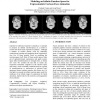Free Online Productivity Tools
i2Speak
i2Symbol
i2OCR
iTex2Img
iWeb2Print
iWeb2Shot
i2Type
iPdf2Split
iPdf2Merge
i2Bopomofo
i2Arabic
i2Style
i2Image
i2PDF
iLatex2Rtf
Sci2ools
121
click to vote
CGIM
2003
2003
Modeling an Infinite Emotion Space for Expressionistic Cartoon Face Animation
Inspired by traditional expressive animation, we attempt to propose an infinite emotion-space as a model to control free-form facial expression synthesis. Although a number of models already exist for capturing, synthesizing, learning and retargeting facial expressions, very few of them actually focus on modeling the emotion-space itself. Most of these models span a finite set of captured/created expressions, and apply modelspace affine transformations to retarget them, or obtain new ones. We consider the fact that in reality any expression essentially originates in the emotion space (the brain), which eventually manifests itself as a group of transformations or interactions of physical body structures (bones, tendons, muscles, skin layers, etc.). In this light, we present an infinite emotion space model for syntheses of an infinite range of expressions for facial animation, limited only by the creativity and imagination of an animator. CR Categories: I.3.5 [Computer Graphics]: Comput...
| Added | 31 Oct 2010 |
| Updated | 31 Oct 2010 |
| Type | Conference |
| Year | 2003 |
| Where | CGIM |
| Authors | Prashant Chopra, Joerg Meyer |
Comments (0)

